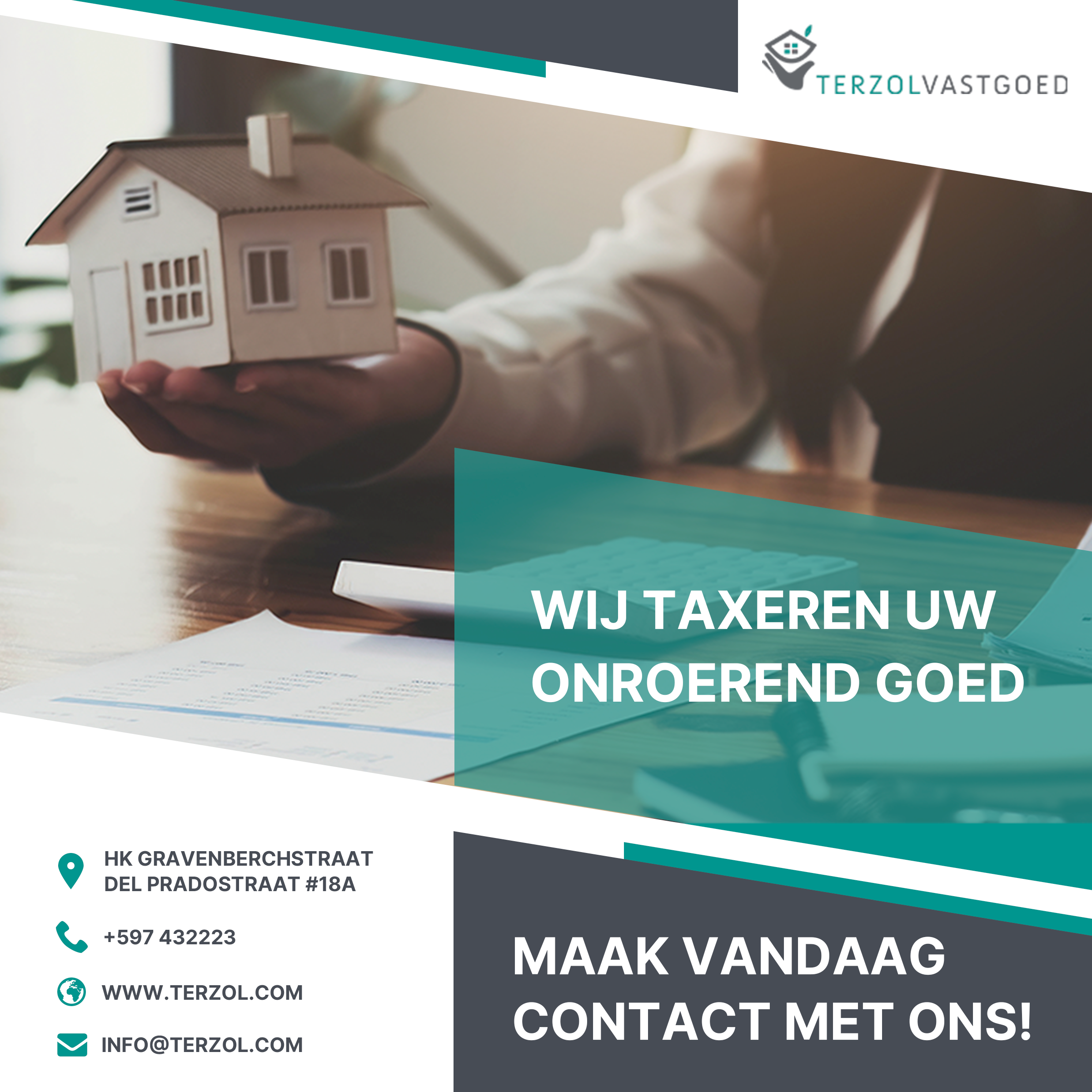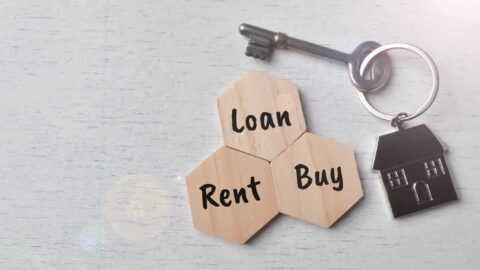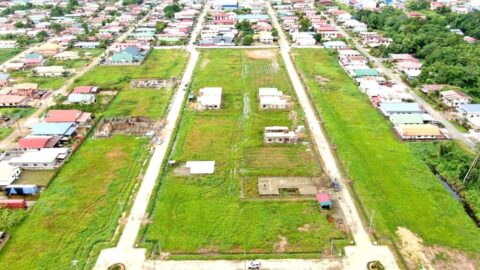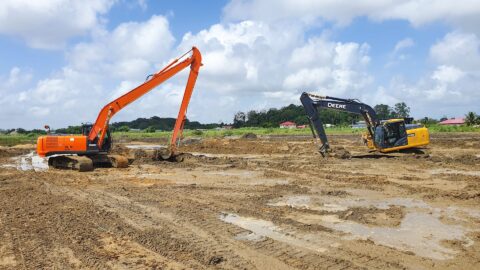Land tax: what’s in it for me?
As of 2017,Terzol Vastgoed NV offers integral services in the areas of purchase and sales brokerage, purchase and rental, appraisals, property management, subdivision, project development and consultancy to national and international, corporate and private clients in Suriname. Terzol Vastgoed N.V. intends to publish a series of articles under the name ‘Grondzaken Nader Belicht’ in the coming period with the following goal: to create or increase the awareness of all stakeholders – including brokers, project developers, investors, landowners, buyers and government – about the various possibilities and legal certainties regarding land matters in Suriname.
Joël Terzol, Senior partner and CEO Terzol Vastgoed N.V., once started as a financial professional in the Netherlands and developed himself in Suriname as an ambitious and successful entrepreneur within the real estate market.
Although buying and selling real estate runs in his blood, he has developed a passion for advising on all kinds of issues related to ground lease, ground rent and estate matters within the real estate market.
In addition, Terzol anticipates the major developments in the Gold, Oil & Gas Industries in Suriname by developing projects in innovative ways to meet the modern needs of expatriates.
Terzol will cover the following topics in the series of articles, namely:
- Domain land
- Ground conversion
- Land tax
- Apartment Law
- Estate matters
- Land Policy
Development of land
The legislature has stated that land in Suriname should be considered a common heritage of the people and should therefore be exploited, protected and managed in the most efficient manner.
Given our previous publications in the series “Land Affairs Nader Belicht”, it must have become clear that most land in our country belongs to the State of Suriname which, because of its bare ownership of the state domain, is the largest real estate trader and must make money with it for the development of our country!
Exploiting land in the most efficient manner ideally implies that the State prepares an annual budget to reflect land costs and land revenues of a spatial development plan, such as a new zoning plan.
These are the costs of preparing land for construction and furnishing public space and overhead such as plan creation and implementation.
On the other hand, it is about the cost of proceeds from the sale of land ready for construction.
After all, why shouldn’t the State be able to subdivide, build and rent it itself?
However, the social reality is, that the State does not encourage land development at all.
Our government received only SRD 7 million for capital and rental value taxes in 2019.
Nevertheless, the same amount has been budgeted for the year 2020.
Such amounts hardly earn the State – especially with the current depreciation of our Surinamese Dollar – and are thus only a drop in the bucket.
However, the State has all the ingredients – namely land with a large market value – to generate development of Suriname’s domain land.
This failure to move forward has serious consequences, as ineffective use of land stagnates economic growth in the country.
What future prospects do young people have?
How can they buy land?
Parents often own land leases intended for their children, but usually do not bring the land into development.
Many land users do not comply with the conditions and legal provisions, which entitles the State as bare owner to revoke the rights to these lands.
Since supervision and enforcement related to land matters are often lacking for the time being, the situation is maintained.
In other words, the State earns no money from these issued lands and cuts itself in the fingers as a result.
Imagery
The Biblical story in Luke 19 verses 11 to 27 about the parable of the silver pieces illustrates that both the State and land users must make the best use of the common heritage of the people in order to make progress.
In this story, a rich man going on a journey gives one silver piece to each of his three servants to conduct business.
When he has returned, he asks them what they did with this silver piece and how much profit they made.
Two of the servants made huge profits, so that their sums were multiplied.
Nevertheless, the third servant, out of fear, buried the silver piece in the ground and thus secured it.
This means that nothing was earned by the third servant.
The important lesson is that what has been entrusted must also be properly exploited, protected and managed!
The question is how to break the current vicious cycle described earlier at the expense of our economic development?
Before answering this question, I will build on the importance of the historical course of the division of land affairs in Suriname cited in the previous article on land conversion.
Aimed at maintaining its position of power, the Dutch colonizer never wanted to hand over full ownership.
In this context, I want to emphasize the difference between allodial ownership and hereditary possession versus ownership according to our current Civil Code.
Allodial ownership and hereditary possession vs Property under the Civil Code
In the thesis “Estate problems in Suriname” by mr. dr. A.C. Akkal-Ramautar, she indicates that “in practice, in her opinion, the opinion has wrongly taken root that allodial ownership and hereditary possession is equated with ownership according to art. 625 of the Civil Code.
According to the author, allodial ownership and heritable possession can be seen as a limited right in rem, where bare ownership is reserved to the State.
The legal character is determined by the special provisions and obligations included per land deed.
Since there are different views on the legal character of allodial property and hereditary possession, Ms. Akkal expressed the view that it is necessary to ascertain what character case law assigns to the right of allodial property and hereditary possession.
After investigation, Ms. Akkal concludes that judicial decisions have shown that the Court of Justice makes a clear distinction between the right of allodial property and hereditary possession, on the one hand, and property as regulated by Article 625 of the Civil Code (BW), on the other.
Below are some court decisions that have shown the Court of Justice’s position:
- Case of Scholtsberg v. State of Suriname
- The Court of Justice refused to equate allodial ownership and hereditary possession with property, as defined in Article 625 of the Civil Code.
In doing so, the Court of Justice pointed to the transitional provisions of the Civil Code in which allodial ownership and hereditary possession were expressly maintained alongside ownership under the Civil Code and stated, “Allodial ownership was in turn expressly maintained in the transitional provisions in the Civil Code, so that this right, and therefore also no right of permission, is equivalent to full and freehold ownership.”
- The Court of Justice refused to equate allodial ownership and hereditary possession with property, as defined in Article 625 of the Civil Code.
- Case plantation “Wrestling Jacobs’v. CoJ 2-11-1951, G.R. 6683
- The Court of Justice ruled that by long-term possession in allodial property was acquired and not property as defined in Article 625 of the Civil Code.
- SRU-HVJ-1997-5
- The Court of Justice explicitly expressed in this ruling, that the right of allodial ownership and hereditary possession is not equivalent to full and freehold ownership.
There is no question in this case of the right in rem of ownership, as defined in Article 575 in conjunction with Article 625 of the Civil Code, so that the provisions on prescription in the Civil Code as a method of acquiring property are not applicable.
- The Court of Justice explicitly expressed in this ruling, that the right of allodial ownership and hereditary possession is not equivalent to full and freehold ownership.
Returning to answering the question of how to break the current vicious cycle to the detriment of our economic development, I underscore that I am a supporter of introducing land tax for all land users.
Land tax
The first benefit of land taxation is to encourage the direct development of land, which benefits every Surinamese, and secure the future of our country and people.
The conditions for this to succeed are that implementation, compliance and enforcement of legislation must take place and weak institutions must be strengthened.
To date, this has not happened with the result that land development has stagnated and provided room for improper practices.
In the article on Land Conversion I substantiated, that land conversion should always be done in conjunction with the application of land tax.
The second advantage is that by introducing land tax for all land users, the State obtains a periodic source of revenue for the State treasury.
Applying the principle of “the widest shoulders bear the most” promotes an equitable distribution of land.
The Surinamese people who have a standard plot of 500m2 and where land rent is converted into ownership, will ultimately not feel the burden of paying land tax on this.
Precisely this target group will benefit greatly from having their limited rights in rem converted into ownership and also formalized, because they will no longer be burdened with all kinds of red tape.
Think of not having to obtain the required approval from the Ministry of Land Policy and Forestry when selling land, no longer having to stand in long lines to pay rent, and no longer having to run the risk of losing land through lengthy procedures based on the heritability of the right to land rent and the possibility of suspension, as stipulated in Articles 16 and 17 of the Decree on the Execution of Land Purchase (DUD).
In contrast, large land users as the broadest shoulders will have to pay the most land tax.
Third, as a result of the introduction of land tax, land prices are expected to go down.
There will be a greater supply of land for sale and land will be more equitably distributed and developed.
Currently, there are many speculators – such as foundations, pension funds, banks, individuals – who have large portfolios under management.
They invest in land because this property costs them nothing and sell it at a profit, while the State maintains many of these lands but earns nothing at all from them.
Nor does it bring any economic development.
In short: Not only will land users with limited rights in rem be able to obtain absolute ownership.
Combined with the introduction of land tax for all land users, State revenues will also be guaranteed for a longer term.
It is a win win situation because both the land users and the State will benefit.
Land tax calculation
For the calculation of land tax, it is only about knowing what the land title is and how big the land is.
Since the introduction of land tax is expected to evoke a lot of resistance and the people have no confidence in the use of the tax monies for the country of Suriname in general, it is really important for the State to establish in advance in the policy what the monies obtained from this directly collectable tax should be spent on and provide adequate information about it.
The State as an entrepreneur needs money to facilitate the socially weak in society as well as the higher segment.
Think of social housing, housing construction for senior citizens and the commercial real estate with the necessary level of facilities for the middle class.
Paying taxes
By the way, it cannot be stressed enough that paying taxes should be fun!
Our current tax system does not offer sufficient tax benefits to the payer.
One does not see back what is done with the money.
The bottom line is that we now pay for the past: with the land conversion funds, the State settles outstanding debts and obligations.
However, in order to invest in the future, the Land Tax monies must go into a separate pot.
The application of this combination of Land Tax and Land Conversion is necessary because otherwise the country of Suriname will sell its resources to pay only our debts and then we will not get ahead!
Given the existing gap between the actual land ownership of a natural person or legal entity and the official land issuance, it is essential that in the interest of legal certainty, decrees must be issued and monitoring of compliance with the conditions and legal provisions actually take place.
Land valuation
The aforementioned emphasizes again that the State has the right of ownership of lands belonging to the State domain and has remained bare owner of all issued lands in Suriname.
As land lessee, you are restricted to use the land for the purpose for which the State of Suriname has issued the right of land lease or allodial ownership and hereditary possession; therefore, pursuant to art. 25 DUD, you are subject to some obligations and conditions – such as the land lease fee, destination of the land lease and possibilities whereby the right of land lease can be annulled – that you do not have with the right of ownership.
The clapper value, the minimum value for transfer of plots expressed in foreign currency, does not take into account the difference between ground rent and ownership plots.
This gives the appearance that both land titles have equal values, while the market value of land leases differs relative to ownership.
Lock
The Decree Principles of Land Policy allows levies to be made on all domain land.
This includes allodial ownership and hereditary possession.
In the future, land users will have to make a choice whether they wish to retain the limited right in rem or obtain full ownership.
This would mean that they would have to pay canon fees in combination with a lower land tax or, in the case of full ownership, have more legal security but pay a higher land tax in return.
By the way, it is by no means mandatory to use land conversion.
Since the MI-GLIS holds the registration of all plots, it is possible to have supervision and enforcement.
When innovativeness is shown and systems of, for example, MI-GLIS, CBB and the Ministry of GBB with their information flows related to land matters are linked, land users could meet their payment obligation in a low-threshold and centralized manner in a giro-based manner.
This is why the political will and conducting a public discussion on land issues c.q. introduction of land tax is so important!
On September 26, 2020, the President to regulate land policy appointed the Committee on Land Conversion and Land Policy Review.
In view of the above points, it is recommended to the Land Commission to orient itself more broadly than just the technical aspects of land conversion.
I invite said committee to engage in dialogue with me and partly with the insights gained to develop new land policies for the next 10 years.
Following the publication of the previous two articles, I am in dialogue with the Ministry of Land Policy and Forestry and offer perspective for the future.
Joel Terzol E-mail: [email protected]















